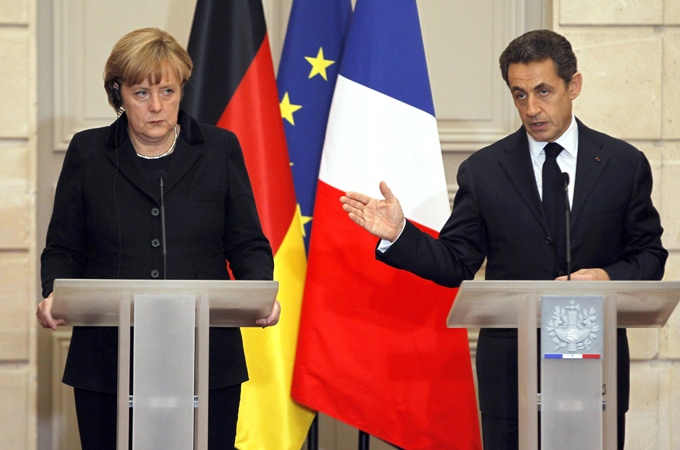UK veto threat clouds euro rescue efforts
Cameron says any treaty changes must safeguard British interests, raising prospect of divisions at crucial EU summit.

 |
| France and Germany agreed on a series of reforms to address the eurozone sovereign debt crisis [Reuters] |
The leaders of France and Germany will not leave the negotiating table until a “powerful deal” to bolster the eurozone is agreed, France’s finance minister said as the threat of a British veto of proposed changes to the European Union treaty clouded preparations for this week’s crucial summit in Brussels.
Francois Baroin reiterated France’s commitment to saving the single currency bloc as he held talks in Paris on Wednesday with Timothy Geithner, the US treasury secretary.
French President Nicolas Sarkozy and German Chancellor Angela Merkel, the leaders of the eurozone’s largest economies, said earlier this week they wanted a new treaty by March to tighten fiscal rules for member states and impose automatic punishments on governments that overspend.
“Neither Nicolas Sarkozy nor Angela Merkel will leave the negotiating table of this summit until there is a powerful deal,” Baroin told Canal+ television.
Geithner also expressed US support for the Franco-German plan, saying: “I have a lot of confidence in what the president of France and the minister are doing, working with Germany to build a stronger Europe.”
But David Cameron, the British prime minister, earlier threatened to block any treaty changes designed to save the euro if London’s demands for the protection of the UK’s huge financial sector and the single market were not met. The UK is a member of the EU, but not of the 17-nation single currency bloc.
His statement appeared to increase the likelihood that France and Germany would end up pushing for an agreement between just the 17 nations who use the euro and not all 27 EU states.
For the EU treaty to be reformed to allow greater eurozone integration, all members of the bloc must agree.
‘Defending British interests’
Cameron’s remarks are likely to anger under-fire eurozone leaders as they scramble to come up with a convincing rescue plan after the Franco-German proposal was overshadowed by credit ratings agency Standard & Poor’s threat of a sweeping eurozone downgrade.
 |
| Cameron’s party has been dogged by internal differences over European integration since the 1990s [EPA] |
He said his main aim at Friday’s summit was “to defend and promote British interests”, although he recognised it was in London’s interests for eurozone leaders to quickly resolve the crisis.
“If they choose to use the European treaty to do that, then obviously there will be British safeguards and British interests that I will want to insist on,” he said.
“I won’t sign a treaty that doesn’t have those safeguards in it, around things like, of course, the importance of the single market and financial services.”
In an article for Wednesday’s Times newspaper, Cameron explained his demands would be “practical and focused” but warned EU leaders that this should not be interpreted as a “lack of steel”.
The British leader has come under pressure from the vocal eurosceptic wing of his right-wing Conservative party, who favour loosening ties with the EU, to use the possibility of renegotiating EU treaties to reclaim powers from Brussels.
The UK has previously voiced opposition to a Franco-German plan for an EU-wide financial transaction tax over fears it would threaten London’s status as one of the world’s major financial centres, insisting any such measure must be applied worldwide to be effective.
Internal tensions
Cameron added that if eurozone countries “choose to go ahead with a separate treaty, then clearly that is not a treaty that Britain would be signing or would be amending.”
He also called on eurozone members to address “a problem of competitiveness” caused by trade imbalances within the bloc.
After a cabinet colleague called at the weekend for a referendum on a new treaty, Cameron was forced to insist on Monday that a public vote was unnecessary as significant powers would not be passing from London to Brussels.
Under legislation passed last year, Britain must hold a referendum if such a transfer of power takes place.
The issue also threatens to cause tensions with the junior partner in Cameron’s coalition government, the pro-European Liberal Democrats.
The issue of Europe has long been divisive for the Conservatives, who have been dogged by internal differences over European integration since the 1990s.
In October, Cameron suffered the largest opposition of his premiership when 79 Conservative members of parliament voted in favour of a referendum on Britain’s relationship with Europe.
The government won the vote by 483 votes to 111 due to support from the Liberal Democrats and the main opposition Labour party.